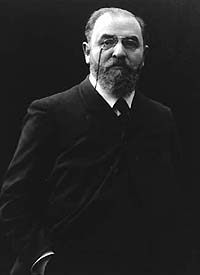Léon Bourgeois
Léon Victor Auguste Bourgeois (born May 21, 1851 in Paris , France, † September 29, 1925 in Épernay ) was a French lawyer and statesman . He is considered one of the spiritual fathers of the League of Nations . As the first president of the League of Nations, he received the Nobel Peace Prize in 1920 . Bourgeois was also one of the most important French politicians in France during the Third Republic .
life and work
Early years and education
Léon Bourgeois was born in Paris in 1851 to a Jewish family, his father was a watchmaker. After attending school, Léon trained as a businessman, which was followed by a law degree at the University of Paris. He then worked briefly as a lawyer and in 1882 became Prefect of the Tarn Department and in 1885 chief administrative officer of the Haute-Garonne Department . In 1887 he became the police prefect in Paris. In 1880 he was accepted into the Freemasons' Association in the Sincerité Masonic Lodge.
Political career
Bourgeois' political career began in 1888 as State Secretary in the Ministry of the Interior under Charles Thomas Floquet , but after disagreements he resigned from this office in 1889. In 1895 he became Prime Minister of France and formed the first purely left-wing democratic cabinet in France. He was particularly committed to social issues and reformed labor laws, schools and universities, and health care. After about a year he resigned and went into the opposition because he could not implement his program. In 1896 he wrote his book Solidarité with the plan for a League of Nations and the use of arbitration.
From 1902 to 1904 Bourgeois was President of the Chamber of Deputies and, in 1906, Foreign Minister of France for a short time. As early as 1899 he was chairman of the French delegation to the Hague Peace Conference and chaired the commission for international arbitration. At the second Hague Conference in 1907, he made arbitration one of the main subjects of the negotiations.
During the First World War, Bourgeois again held several ministerial offices and was primarily concerned with the social consequences of the war. In 1918 he became a member of a government commission to draw up plans for the League of Nations . When this became a reality in 1919, he demanded a strong executive in the form of separate army and police powers for the federal government so that it could enforce its demands. This proposal was mainly rejected by the United Kingdom . In 1920 Bourgeois was elected the first President of the Council of the League of Nations and from 1920 to 1923 he was President of the French Senate. He then retired from politics, mainly for health reasons, progressive blindness, and died in 1925.
Fonts
-
Solidarity. Paris 1897
- German edition: Solidarity. From the foundations of lasting peace , from the French and with an afterword by Effi Böhlke, Suhrkamp, Berlin 2020, ISBN 978-3-518-29893-0 .
- Diplomacy you droit. Delagrave, Paris 1909
- Discours prononcé à l'assemblée générale constitutive du 10 novembre 1918. Paris 1918
- Essai d'une philosophie de la solidarité. Alcan, Paris 1902
- The oeuvre de la société des nations. Payot, Paris 1923
- Le pacte de 1919 et la société des nations. Fasquelle, Paris 1919
- Le traité de paix de Versailles. Alcan, Paris 1919
literature
- Bernhard Kupfer: Lexicon of Nobel Prize Winners. Patmos-Verlag, Düsseldorf 2001, ISBN 3-491-72451-1
Web links
- Literature by and about Léon Bourgeois in the WorldCat bibliographic database
- Information from the Nobel Foundation for the award in 1920 to Leon Bourgeois (English)
- Newspaper article about Léon Bourgeois in the 20th century press kit of the ZBW - Leibniz Information Center for Economics .
Footnotes
- ^ Documents submitted to Les Prix Nobel
- ↑ Jürgen Holtorf: The lodges of the Freemasons. Nikol, Hamburg 2000, ISBN 3-930656-58-2 , p. 141
| personal data | |
|---|---|
| SURNAME | Bourgeois, Léon |
| ALTERNATIVE NAMES | Bourgeois, Léon Victor Auguste (full name) |
| BRIEF DESCRIPTION | French lawyer and statesman |
| DATE OF BIRTH | May 21, 1851 |
| PLACE OF BIRTH | Paris , France |
| DATE OF DEATH | September 29, 1925 |
| Place of death | Epernay |
